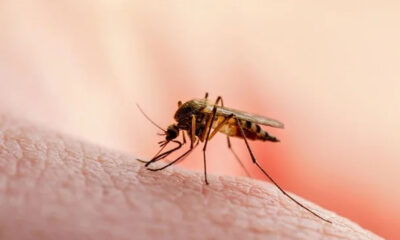Health
Nigeria misses out as 18m doses of first-ever malaria vaccine arrive in Africa

Nigeria misses out as 18m doses of first-ever malaria vaccine arrive in Africa
18 million doses of the first-ever malaria vaccine (RTS,S/AS01) will be given to 12 nations in various parts of Africa between 2023 and 2025.
This was revealed on Wednesday in a joint press statement by GAVI, the Vaccine Alliance, World Health Organization and United Nation Children’s Fund.
The RTS,S/AS01 vaccine is the first vaccine recommended for use by the World Health Organisation to prevent malaria in children in areas of moderate to high malaria transmission.
“Since 2019, Ghana, Kenya, and Malawi have been delivering the malaria vaccine through the Malaria Vaccine Implementation Programme, coordinated by WHO and funded by Gavi, the Global Fund to Fight AIDS, Tuberculosis and Malaria, and Unitaid.
“The RTS,S/AS01 vaccine has been administered to more than 1.7 million children in Ghana, Kenya, and Malawi since 2019 and has been shown to be safe and effective, resulting in a substantial reduction in severe malaria and a fall in child deaths. At least 28 African countries have expressed interest in receiving the malaria vaccine.
READ ALSO:
- N1,000 POC on vehicles is double taxation- Lagos Lawyer
- Lagos recorded 111 defilement cases in 3 months – Police
- Resident doctors give FG two weeks to implement 200% salary raise
“In addition to Ghana, Kenya, and Malawi, the initial 18 million dose allocation will enable nine more countries, including Benin, Burkina Faso, Burundi, Cameroon, the Democratic Republic of the Congo, Liberia, Niger, Sierra Leone, and Uganda, to introduce the vaccine into their routine immunization programmes for the first time, ” the statement read in part.
The statement noted that this allocation round makes use of the supply of vaccine doses available to Gavi via UNICEF, stating that the first doses of the malaria vaccine are expected to arrive in the selected countries during the last quarter of 2023 while the countries will start to roll them out by early 2024.
The allocations, according to the report, were made using the framework for allocating the limited supply of malaria vaccine, which prioritizes those doses to areas with the greatest need and the greatest risk of malaria disease and child mortality.
The Managing Director of Country Programmes Delivery at Gavi, Thabani Maphosa, said the vaccine has the potential to be very impactful in the fight against malaria, and when broadly deployed alongside other interventions, “it can prevent tens of thousands of future deaths every year.”
READ ALSO:
- EFCC convicts two for Crypto, Facebook scam in Abuja
- Kano anti-corruption agency confirms authenticity of Ganduje dollar videos
- Police dismiss killer cop Kabiru Odejimi, to arraign him on July 7
Maphosa added, “While we work with manufacturers to help ramp up supply, we need to make sure the doses that we do have are used as effectively as possible, which means applying all the learnings from our pilot programmes as we broaden out to a new total of 12 countries.”
Malaria remains one of Africa’s deadliest diseases, killing nearly half a million children each year under the age of five, and accounting for approximately 95 percent of global malaria cases and 96 per cent of deaths in 2021.
According to the UNICEF Associate Director of Immunisation, Ephrem Lemango, “Nearly every minute, a child under five years old dies of malaria.”
Lemango revealed that “For a long time, these deaths have been preventable and treatable; but the roll-out of this vaccine will give children, especially in Africa, an even better chance at surviving. As supply increases, we hope even more children can benefit from this life-saving advancement.”
The WHO Director of Immunisation, Vaccines and Biologicals, Dr Kate O’Brien, said the malaria vaccine was a breakthrough to improve child health and child survival; and families and communities.
“This first allocation of malaria vaccine doses are prioritised for children at the highest risk of dying of malaria. The high demand for the vaccine and the strong reach of childhood immunisation will increase equity in access to malaria prevention and save many young lives. We will work tirelessly to increase supply until all children at risk have access,” O’Brien said.
Nigeria misses out as 18m doses of first-ever malaria vaccine arrive in Africa
Health
NAFDAC destroys N120bn ‘merchants of death’ fake products

NAFDAC destroys N120bn ‘merchants of death’ fake products
The National Agency for Food and Drug Administration and Control (NAFDAC) announced that it destroyed over ₦120bn worth of seized products between July and December 2024 across the six geopolitical zones and the Federal Capital Territory.
NAFDAC also reassured Nigerians that measures are in place to safeguard their health before, during, and after the yuletide season.
This was disclosed in the Christmas message from NAFDAC’s Director-General, Prof. Mojisola Adeyeye, as contained in a statement signed by the agency’s Resident Media Consultant, Sayo Akintola, on Sunday.
Adeyeye emphasised the importance of eating safely during the Yuletide period and advised Nigerians to purchase food and drinks from outlets with identifiable addresses to facilitate the agency’s tracking processes.
She warned against eating pharmaceuticals and packaged food products that do not have NAFDAC registration numbers, noting that exceptionally low-cost products are likely to be contaminated.
READ ALSO:
- Lagos govt nightclubs, worship centres must obtain permit for amplified sound
- Alleged missing N180m: It’s a prank, Singer Dammy Krane says
- Inter Milan crush Cagliari 3-0 to top Serie A
She also revealed that the agency’s Investigation and Enforcement Directorate is continuing to remove substandard and fraudulent pharmaceuticals, as well as unwholesome food items, from marketplaces around the country.
“Officers from the Investigation and Enforcement, Pharmacovigilance, and Post-Marketing Surveillance Directorates are in the field confiscating falsified medicines, fake wines and drinks, and unwholesome food products that could jeopardise public health during the festive season,” she said.
In December 2024, the agency destroyed expired and unregistered drugs worth ₦11bn in Ibadan and seized counterfeit alcoholic beverages and medicines worth billions of naira in Lagos.
In Nasarawa State, the agency uncovered a factory packaging counterfeit rice and confiscated over 1,600 bags worth ₦5bn.
Adeyeye emphasised NAFDAC’s commitment to ensuring that the Nigerian market only contains safe, high-quality food and medicines.
She warned that the agency would step up efforts to put counterfeiters out of business, branding them as “merchants of death.”
NAFDAC destroys N120bn ‘merchants of death’ fake products
Health
NAFDAC destroys N5bn fake, expired products in Aba

NAFDAC destroys N5bn fake, expired products in Aba
The National Agency for Food and Drug Administration and Control (NAFDAC) has shut down 150 shops at Eziukwu Market in Abia over fake and expired products Worth N5 billion.
The agency disclosed this in a statement on Wednesday on X.
NAFDAC said the shops were shut during a two-day operation on December 16 and 17, while products valued at N5billion were destroyed at the market.
The director of the South-East zone, Martins Iluyomade, expressed dismay at the continued illegal activities despite a previous undertaking signed by market leaders in December 2023 to expose counterfeiters.
READ ALSO:
- Speaker Abbas to Tinubu: Your reforms have disrupted status quo
- Abuja demolition: Soldiers attack FCTA officials, seize vehicles
- Onion price rises over 100%, flooding, inflation blamed
According to the statement, Mr Iluyomade described the market as a hub for counterfeit and substandard products.
“Our team uncovered a large-scale production and distribution of fake and expired goods, including beverages, carbonated drinks, wines, spirits, and vegetable oils.
“Revalidated food items such as milk, yoghurt, noodles among others were also destroyed,” the statement said.
It reaffirmed NAFDAC zero tolerance for such practices and emphasised its unwavering commitment to safeguarding public health while working toward a permanent solution to the problem of counterfeiting in the market
NAFDAC destroys N5bn fake, expired products in Aba
(NAN)
Health
Eating fish regularly minimises risk of incurable hearing condition – Study

Eating fish regularly minimises risk of incurable hearing condition – Study
Tinnitus is the sound of ringing in the ears. It may also be described as roaring, buzzing, hissing, or clicking inside the head. The sounds may come and go. Or they may be ongoing. The sounds range in severity from a mild distraction to a disabling condition and may manifest with buzzing, hissing, or clicking inside the head.
The sound may happen in one or both ears and may have different tones. A team from Brigham and Women’s Hospital in Boston studied 73,000 individuals to understand how common this disorder is, which affects millions with a constant ringing in their ears.
Over a span of 30 years, those who consumed more than two servings of fish weekly had nearly 25 percent lower odds of getting tinnitus compared to those who seldom or never ate fish. Even eating just one serving a week resulted in a 13 percent reduced risk.
Certain types of fish, like tuna, light-fleshed varieties such as cod or halibut, and shellfish, were linked to a reduced risk, while darker fish like salmon and swordfish seemed to increase the risk.
READ ALSO:
- No litigation delaying Lekki int’l airport construction, says Lagos govt
- Ondo: Jilted husband kills self, sets wife ablaze
- Military sends Special Operations Brigade to quash Lakurawa terrorists
Interestingly, fish oil supplements, known for their benefits to heart, brain, and joint health, were also connected to a higher risk of tinnitus. It’s estimated that tinnitus is diagnosed in almost 1 in 6 persons.
While age-related hearing loss, ear injuries, and circulation issues are known to contribute to tinnitus, the exact cause remains unclear. Previous studies have suggested that dietary factors, such as high levels of calcium, iron, and fat, might heighten the risk. However, this new research is the first to analyse data over such a lengthy period.
Past findings have also shown that seafood can lower the risk of hearing loss, with one study suggesting that increased fish consumption might reduce hearing issues by up to 20 percent. Scientists believe that the omega-3 fatty acids in fish could protect inner ear cells or reduce inflammation caused by loud sounds, chemicals, or infections.
The Boston team’s investigation, based on a database of US nurses, aims to shed light on the connection between fish consumption and tinnitus, potentially aiding future patients. The authors of the study expressed hope that identifying factors that can be changed might help in preventing tinnitus and guiding targeted treatments.
Eating fish regularly minimises risk of incurable hearing condition – Study
-

 Auto2 days ago
Auto2 days agoLSM MD extols founder’s qualities after latter posthumous industry award
-

 Entertainment2 days ago
Entertainment2 days agoMultiChoice announces free access to all DSTV channels for 3 days
-

 News2 days ago
News2 days agoNigeria Customs Service begins 2025 recruitment [How to apply]
-

 metro3 days ago
metro3 days agoJigawa State governor loses son 24 hours after mother’s death
-

 metro2 days ago
metro2 days agoHeavy security in Ilesa as ex-Osun deputy gov emerges new Owa-Obokun
-

 metro2 days ago
metro2 days agoLagos Imam to Tinubu: You haven’t disappointed us
-

 metro2 days ago
metro2 days agoDangote, Tinubu, Lookman named among 100 most influential Africans in 2024 (Full list)
-

 Sports2 days ago
Sports2 days agoRonaldo, Vinicius, Yamal win big at 2024 Globe Soccer Awards [Full list of winners]









